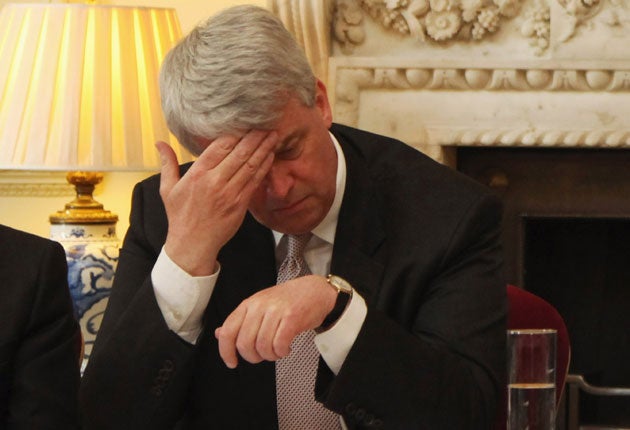
Your support helps us to tell the story
From reproductive rights to climate change to Big Tech, The Independent is on the ground when the story is developing. Whether it's investigating the financials of Elon Musk's pro-Trump PAC or producing our latest documentary, 'The A Word', which shines a light on the American women fighting for reproductive rights, we know how important it is to parse out the facts from the messaging.
At such a critical moment in US history, we need reporters on the ground. Your donation allows us to keep sending journalists to speak to both sides of the story.
The Independent is trusted by Americans across the entire political spectrum. And unlike many other quality news outlets, we choose not to lock Americans out of our reporting and analysis with paywalls. We believe quality journalism should be available to everyone, paid for by those who can afford it.
Your support makes all the difference.The Health Secretary, Andrew Lansley, is resisting a key Downing Street demand to give hospital doctors a greater say in the care that is commissioned for NHS patients.
The Independent understands that Mr Lansley has agreed to demands by Number 10 that significant parts of his controversial health reforms should be watered down or removed entirely from the Health and Social Care Bill before it returns to Parliament. But the Health Secretary is said to be holding out on a key concession demanded by hospital doctors that they should have a role in deciding what care the NHS provides to patients – and where it should be provided.
He is understood to be concerned that if hospital doctors are allowed to join the new GP Commissioning Boards they might have a conflict of interest – as they would be involved in commissioning care and benefiting from that commissioning.
However Downing Street aides are determined that Mr Lansley should back down entirely. Yesterday stories emerged in the press that Jeremy Hunt, the Culture Secretary, could be a possible replacement for Mr Lansley if he refuses to make the necessary concessions.
The touting of Mr Hunt's name puts pressure on Mr Lansley to concede further ground. He has become increasingly isolated in the health debate and caught between Mr Cameron and the Deputy Prime Minister, Nick Clegg, who are both determined to get the political credit for altering his flagship bill.
Downing Street sources said yesterday that agreement had already been reached in Government that all references in the bill to promoting competition between the NHS and private providers will be removed.
In addition, a clause will be reinstated requiring the Secretary of State to take full responsibility for providing a comprehensive and inclusive health service free at the point of delivery.
It will also be announced that GP Commissioning boards will have wider representation, including nurses, council representatives and an independent chair. The only issues that remain are thought to be the role of hospitals in commissioning and the timescale for the reforms to be implemented.
Speaking yesterday in an opposition debate on the bill, Mr Lansley insisted that while there would be concessions, he wanted to stick to the principles of reform.
"Let me be clear, there will be substantive changes to the Bill in order to deliver improvements for patients but there is only one issue for me: will it deliver better care for patients? That is why we are going to pursue NHS modernisation. That is why we will stick to our principles. It is equally why we are listening to improve the Bill."
Shirley Williams, the Liberal Democrat peer whose public concerns over the changes were in part responsible for re-opening the bill, said she would not be calling for Mr Lansley to step down. But she added: "He is an able man. Whether he feels he can continue in his job I don't know."
The Shadow Health Secretary, John Healey, said David Cameron was "listening to anybody and everybody on the NHS except the Health Secretary".
Possible concessions
* Only GPs who are "willing and able" would take responsibility for commissioning £60bn of NHS care.
* Competition would be regulated with private firms prevented from cherry picking profitable areas such as routine surgery, and provision made for long-term conditions which require collaboration between GPs and hospitals
* Accountability of GP consortia would be tightened to monitor conflicts of interest, and board membership extended to include hospital doctors.
* The deadline of 2013 for implementation of the reforms to be relaxed.
JEREMY LAURANCE, HEALTH EDITOR
Join our commenting forum
Join thought-provoking conversations, follow other Independent readers and see their replies
Comments